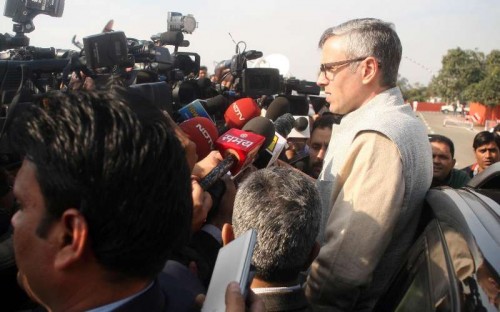
Outgoing Jammu and Kashmir Chief Minister Omar Abdullah took potshots at the PDP and the BJP amid signs that they were close to an agreement to form a coalition government.
Reacting to reports that the two parties were close to start structured negotiations on sewing up an alliance, Abdullah wondered how far they would go with the sole intention of taking power in the state.
Abdullah said the Bharatiya Janata Party (BJP) had attacked him in the past for seeking revocation of the Armed Forces Special Powers Act (AFSPA) but was now reportedly discussing this issue with the PDP.
“So when I raised AFSPA I was accused of playing politics with (national security). The BJP negotiates (government) formation with PDP using AFSPA, and that’s OK??” Abdullah wrote on his Twitter handle.
Abdullah also said the Peoples Democratic Party was using the issue of flood relief to justify its negotiations on government formation with the BJP.
“We are being told by the PDP that the tie up with (the) BJP is necessary for the 44,000 (crore) flood relief. Shouldn’t a state just get its due?”
Abdullah’s comments came on a day BJP president Amit Shah holds a crucial meeting in New Delhi with the party’s core Jammu and Kashmir group to discuss government formation in the country’s only Muslim-majority state.
Sources in both the BJP and the PDP told IANS that the ice had been broken and an announcement of a formal dialogue on government formation was expected sooner than later.
Assembly elections produced a hung 87-member house. The PDP won 28 seats, dominantly from the Muslim-dominated Kashmir Valley, while the BJP got all its 25 seats from the Hindu-majority Jammu region.
Abdullah’s National Conference and the Congress have 15 and 12 members in the house respectively.
Any government will need the support of at least 44 legislators.
The sources said an informal agreement had been reached on most issues and this would be given a formal shape in two to three days.
“A meeting between (PDP leader) Mufti Muhammad Sayeed and Prime Minister Narendra Modi is likely once the arrangement is formalised,” a source said.
Earlier, both the BJP and the PDP — which have held divergent views on some issues linked to Jammu and Kashmir — asserted that they would not compromise on what they said were “basic issues”.
The favours retaining article 370 of the constitution which gives special status to Jammu and Kashmir. The BJP has traditionally opposed this.
The PDP also wants the AFSPA, which gives sweeping powers to security forces, to go. The BJP does not agree.
Last week, PDP and BJP leaders called on Governor N.N. Vohra, who reportedly told them to return to him by Jan 19 with a formal proposal on government formation. The term of the outgoing assembly ends that day.